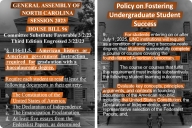You have /5 articles left.
Sign up for a free account or log in.
.jpg?itok=_u21C1wc)
As voters head to the polls this election cycle, some college trustees will be on the ballot for other offices.
Laurence Dutton/Getty Images
In the state primaries that wrapped Tuesday night, current and former college trustees were among both the winning and losing candidates. Now some are headed to the general election in November, while others are ending their campaigns. Meanwhile, a few are awaiting primary day at the upcoming polls in their states.
Higher education is poised to become a key issue in this fall’s electoral contest, with presidential candidates Joe Biden and Donald Trump both weighing in on subjects ranging from student loan forgiveness to campus protests over the Israel-Hamas war. Other contentious culture war issues—including transgender athlete participation, LGBTQ+ programming on college campuses and diversity, equity and inclusion efforts—have also garnered attention from both Republican and Democratic candidates.
So perhaps it's not surprising to find so many current and former trustees on the campaign trail; after all, they’ve had a front-row seat onto all the recent campus drama, sharpening their views and shaping policy goals regarding higher ed. Clearly, some have won over primary voters in their home states; whether they can prevail in the general election remains to be seen.
Trustees Seeking Office
Governing board members running in 2024 represent a range of states and political parties. Among those identified by Inside Higher Ed, all serve on governing boards of public institutions; all but one were appointed rather than elected as a trustee or regent, which is less common. Most are running for state offices.
Board members up for election come from Haskell Indian Nations University, the University of Colorado, the University of North Carolina at Chapel Hill (which has two trustees vying for state posts), and Wayne State University. A former trustee from Marshall University is also running, as is a former member appointed to the New College of Florida board but never officially confirmed. Both left their respective boards last year.
Chris Miller, who served on the Marshall Board of Governors from 2019 to 2023, threw his hat into the ring to become the Republican candidate for governor in West Virginia. But he largely distanced himself from his time at the university, particularly as other candidates sought to leverage that experience against him.
Transgender issues were a talking point for the top Republican gubernatorial candidates in West Virginia, with each taking a hard stance against transgender athletic participation and accusing one another of allegedly being soft on LGBTQ+ issues. During a back-and-forth between Miller and opponent Patrick Morrisey—the state Attorney General—the conservative website the Daily Caller published an article with the headline “WV Gov Candidate Chris Miller Sat On College Board While School Held Numerous Drag, Pro-Trans Events.”
The Daily Caller specifically pointed to a 2020 drag show and a Homecoming Pride Gala as well as LGBTQ+ programming at Marshall, including a closet to provide clothes for people who have transitioned. The Morrisey campaign cast Miller as complacent in the face of a “woke-trans agenda.” But Miller countered by accusing Morrisey himself of supporting the trans community and criticizing the institution where he served.
“Chris has seen the rot in the universities firsthand as communists and the woke mob take over. He realized you could only get so much done from the board, which is why he only served one term and then decided to run for governor,” a spokesperson for the Miller campaign told The Daily Caller last month, adding that Miller is “running to stop” an alleged radical transgender agenda.
Miller, who lost to Morrisey Tuesday, did not respond to a request for comment from Inside Higher Ed.
In North Carolina, two UNC Chapel Hill trustees are seeking state office. Brad Briner, who is running for state treasurer, advanced in the first Republican primary held on March 5. Fellow UNC Chapel Hill trustee Dave Boliek, also a Republican, secured his spot on the ballot for state auditor by winning a runoff on Tuesday. Voters will now decide their electoral futures in November.
On Monday, the day before the election, the UNC Chapel Hill board voted unanimously to shift $2.3 million from DEI initiatives to the university police department. Boliek, who chairs the board’s budget and finance committee has called DEI “cultural indoctrination” and “divisive.” Various social media users underscored the strike against DEI as a reason to vote for Boliek.
Boliek did not respond to a request for comment from Inside Higher Ed.
While some primaries concluded on Tuesday, many other states have yet to go to the polls. But when they do, a handful of candidates from university boards will be on various electoral ballots.
In Colorado, which has a June 25 primary, University of Colorado regent at-large Lesley Smith, a Democrat, is aiming for the state House of Representatives from Colorado’s 49th District. Smith, who has served as regent since 2019, is among the rare trustees who are elected to office rather than appointed by the governor or legislature, as is common at public institutions.
In Kansas and Michigan, both of which vote on Aug. 6, two current trustees are running. Brittany Hall, president of the Board of Regents for Haskell Indian Nations Universities is running for the Kansas House of Representatives. In Michigan, Dr. Anil Kumar, who is on the Wayne State University Board of Governors, is aiming for federal office representing Michigan’s 10th Congressional District. Both Hall and Kumar are campaigning for their respective offices as Democrats.
In Florida, which has an Aug. 20 primary, former New College of Florida trustee Eddie Speir is running as a Republican to represent Florida’s 16th Congressional District. Speir, who was tapped as a trustee by Republican Governor Ron DeSantis amid a conservative overhaul of New College in January 2023, served briefly on the NCF board. Though he participated in board meetings, Speir’s appointment was not confirmed by Florida’s Senate last spring, marking a rare rejection for the DeSantis agenda, which conservative lawmakers have largely rubber-stamped. Rather than outright rejecting Speir, legislators took no action to confirm his appointment.
Not a ‘Stepping Stone’
While there is little data tracking the transition of governing board members to political office, there are some recent examples of electoral success.
Nebraska’s Republican governor Jim Pillen served as an elected regent at the University of Nebraska from 2013 to 2023. As governor, Pillen has regularly clashed with university officials.
In March, he pushed the University of Nebraska Board of Regents to expedite a search for a system president. Though the process followed similar timelines at other Big 10 Institutions and took roughly as long as a presidential hunt Pillen was involved with as a regent, he deemed the length of the search as “unacceptable.” A priority candidate has since emerged for the job.
The governor has also taken aim at the practice of using environmental, social and governance (ESG) criteria in investment decisions made by public bodies—including universities—calling it “liberal political ideology.” But as a regent, and chair of the board’s business and finance committee, Pillen voted in April 2021 to consider ESG criteria in endowment investment strategies, and said in a subsequent press release that “doing nothing is simply not an option.”
Pillen’s office did not respond to a request for comment from Inside Higher Ed.
At the Federal level, Republican representative Bryan Steil made the jump from the Universities of Wisconsin Board of Regents to the state’s 1st Congressional District, entering office in 2019. But despite his board background, Steil has done little related to higher education since his election.
Mary Papazian, executive vice president at the Association of Governing Boards of Universities and Colleges, noted that AGB doesn’t track trustees running for office but suggested it’s somewhat rare, particularly in the many states where boards are appointed rather than elected.
“I don’t think it happens a lot because most people who are interested in public service, do see their appointment to a board as an expression of that public service. And even though they’re volunteer boards, it takes a lot of time if you’re going to be an engaged board member,” Papazian said.
But some board members running for office told Inside Higher Ed they saw new opportunities to share their expertise more broadly. Smith, a scientist and former faculty member at the University of Colorado at Boulder, spent time on a local school board before she was elected regent. And while she has years of experience in public education, she saw other pressing issues around dwindling water resources and climate change that she wanted to focus on.
Smith also noted that her time on the board overlapped with former regent Heidi Ganahl, who was the Republican nominee for governor in 2022, ultimately losing to Democrat Jared Polis.
“I think there's this perception—especially since we are an elected board—that people run for regent as a stepping stone. And to me, that definitely was not the case. I thought, for sure, I was going to run for a second term [as regent] and after 12 years, I'd be done,” Smith said. “But because of the environmental crisis that we are experiencing in the Southwest, I thought I should run because there aren’t a lot of people that have my background on water in the State House.”
Briner, who was appointed to the UNC Chapel Hill board last fall, said there is little overlap between his board service and the state treasurer role he’s pursuing. And given how contentious higher education issues have become, he questions how beneficial the board is as a platform; while Briner believes it’s a worthwhile act of public service, he’s skeptical of any political benefit.
“Whether it’s the people on the far right who think that you’re kowtowing to crazy liberals on the faculty, or the people on the far left who think you’re promoting some ideological takeover of the university, being involved with UNC doesn’t help politically,” Briner said. “I can’t speak for everyone in these roles but being on the Board of Trustees is not ideal in running for office.”
For trustees running for other offices, Papazian stressed the need to separate board duties and personal political ambitions. Specifically, she said they need to remain focused on institutional interests and their fiduciary duties, while consulting any existing conflict of interest policies and the board code of conduct so candidates don’t make ethical missteps while running for office.
“I think it crosses a line when it’s really about your own ambitions,” Papazian said.








